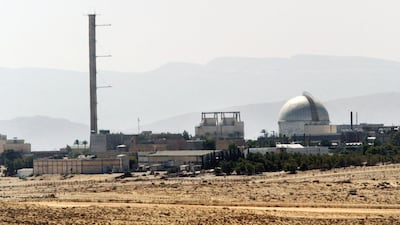Israel's justification for its war against Iran is its claim that Tehran is on the verge of developing a nuclear weapon. The government of Prime Minister Benjamin Netanyahu fears that a nuclear-armed Iran would alter the balance of power in the Middle East and provide Tehran with the ability to follow through on calls for Israel's destruction.
However, Israel remains the only country in the Middle East believed to possess a nuclear arsenal. It has never officially acknowledged holding nuclear weapons, but the Stockholm International Peace Research Institute estimated last January that it has 90 nuclear warheads.
Israel is also believed to possess enough fissile material to produce hundreds more warheads, according to the Centre for Arms Control and Non-Proliferation and the Nuclear Threat Initiative.
Much of what is known or suspected about Israel's nuclear capabilities centres on its facility near the southern town of Dimona. The Negev Nuclear Research Centre is a secretive operation in the Negev Desert.
Israel began its nuclear programme in 1952 by establishing its Atomic Energy Commission. It has operated a nuclear reactor and an underground plutonium separation plant in Dimona since the 1960s, according to the US-based Arms Control Association.
It has been reported that the facility is home to decades-old underground laboratories that have worked to formulate weapons-grade plutonium for a nuclear bomb programme.
For years, Israel has stuck to a policy of ambiguity, only saying it would not be the first nation to “introduce” nuclear weapons to the Middle East.

Worldwide, the UN's International Atomic Energy Agency has said only nine countries openly acknowledge possessing nuclear weapons or are believed to possess them.
The US, Britain, France, Russia and China are officially counted as holders of a nuclear arsenal under the UN Nuclear Non-Proliferation Treaty. The treaty was signed in 1968 by major nuclear and non-nuclear powers and pledged co-operation in preventing the spread of atomic weapons.
Israel has never joined the treaty. The country has fought a number of wars with its Arab neighbours since its founding in 1948 in the wake of the Holocaust. An atomic weapons programme, even if undeclared, provides it with an edge to deter its enemies.
Preventing Iran achieving nuclear status has been a key policy objective of the Israeli government, despite Iran long insisting its nuclear programme is for peaceful purposes and not aimed at making a bomb. Iran signed the Nuclear Non-Proliferation Treaty in 1968.


